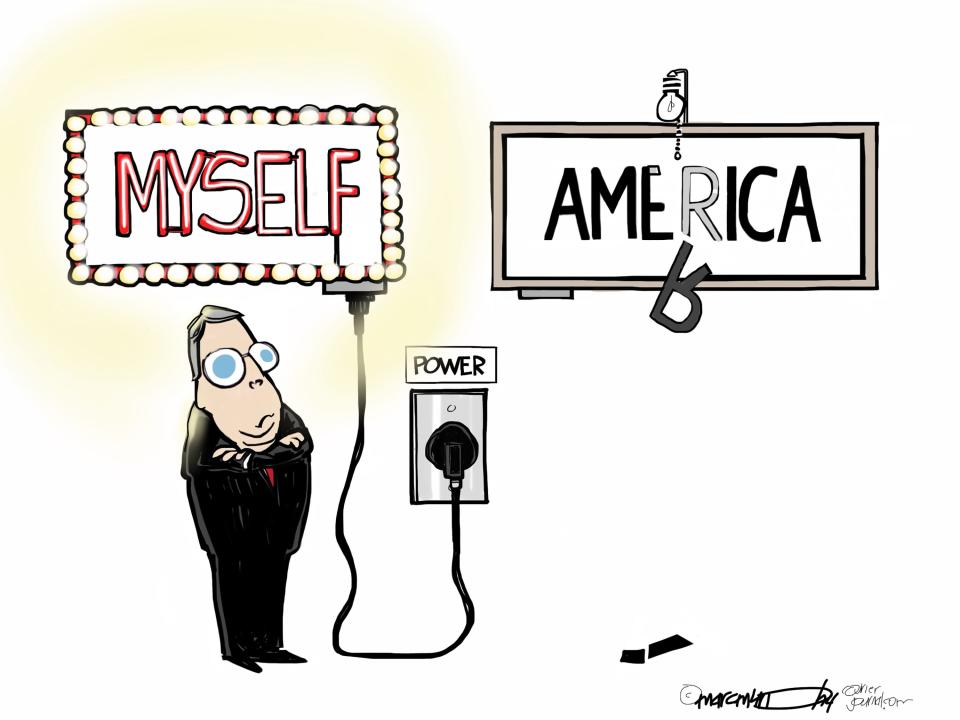Mitch McConnell cedes Senate powers for political standing: Today's talker

Senate Majority Leader Mitch McConnell said Tuesday that he would be fine helping to confirm President Donald Trump's choice to the Supreme Court if an opening were to occur during the 2020 election cycle.
Policy is not the courts' job
By Anthony Marcum
If there were a vacancy in the Supreme Court before the 2020 election, should the Senate fill it?
Senate Majority Leader Mitch McConnell says yes. Democrats say such a decision is hypocritical, noting that McConnell and Senate Republicans blocked President Barack Obama's nomination of Judge Merrick Garland in the lead up to the 2016 presidential election. McConnell's allies say this time is different, because both the president and the Senate majority are from the same party.
No matter where you fall on the debate, it is evident that the politics of judicial confirmations have become corrosive to both our legislative and judicial institutions.
Talker: Abortion extremists on both sides are simplifying a complicated issue
Ask your friends and family to sign-up for the Today's Talker newsletter
Judicial confirmations have been a priority for the Trump administration and the Republican-controlled Senate. This makes sense. On the campaign trail, Trump often spoke about his plan to nominate conservative judges and justices. After his election, Senate Republicans emphasized that confirming judges would be a top priority. And they have been successful: 100 federal judges have been confirmed during Trump's first term, including two Supreme Court justices. But at what cost?
A Senate preoccupied by confirmations has little time for much else. Issues such as health care, immigration and a growing deficit are all concerns that senators talk about at home but abandon once back in Washington. The world's greatest deliberative body should not shy from these complex challenges, or working with their colleagues in the House to achieve real world results.
Further, a Senate that minimizes its own legislative authority inadvertently cedes it to others. Throughout history, presidents have been eager to accept Congress' delegations to write broad regulations, freely conduct foreign relations, and push back against substantive congressional oversight. With it, our notion of separation of powers has tilted off balance.
This misalignment has forced the courts to referee many of our political and policy battles. These battles often put judges in an untenable position. Rule one way and be accused of bias. Rule the other way and be held responsible for the disruption of sweeping executive policy.
Policy is the not job of courts. But when confirmations take priority over legislation and political battles move from Capitol Hill to the courthouse, it's easy to see a troubling trajectory for our independent judiciary.
Anthony Marcum is a research associate at the R Street Institute, focusing on matters concerning the federal judiciary. You can follow him on Twitter: @AnthonyWMarcum.

What others are saying
Rep. Hakeem Jeffries, D-N.Y., Twitter: "Republicans stole a Supreme Court seat from President Barack Obama in 2016. Senate Majority Leader Mitch McConnell just admitted it. John Roberts is the chief justice, but it's really the 'McConnell court.' And it has zero credibility."
Kevin Drum, Mother Jones: "McConnell has practically built his entire career on hypocrisy, and he’s never really tried to hide it. He just shrugs, says what he needs to say, and moves on. I don’t think he really expects or cares if anyone takes him seriously, but treats public explanations as mere tedious parts of his job. In reality, he believes that whoever’s in power should do whatever they can to get their way, and it’s naive to think there are any other considerations. He doesn’t need anyone’s defense on this score."
Former Sen. Claire McCaskill, D-Mo., "The Beat With Ari Melber," MSNBC: "McConnell cares about one thing: that is being the majority leader of the Senate. He sought the power, he has been in the Senate over three decades. ... And he will do anything, including — frankly — cede power to the executive branch, wreak havoc in the judicial branch, whatever it takes to hold on to power, which means, every decision he makes is through a political prism for the Republican members of his caucus."
What our readers are saying
Senate Majority Leader Mitch McConnell is the reason why this country is on a downward path. His partisanship and utter disregard for the Constitution will be the catalyst for the breakup of the union.
— Daniel Hamilton
Why is McConnell saying he would confirm a justice during an election year, after he said he wouldn't do it, such a big deal? Both sides do the same thing when they have the chance.
— Jim Malefyt
In essence, McConnell and other Senate Republicans changed the number of Supreme Court justices from nine to eight temporarily, which is not in the best interests of this country, in order to secure a conservative court. I think the next Democratic president should increase the number of justices from nine to 13 permanently, in order to fill the court with justices who are more representative of the American populace.
— Ken Brockington
McConnell has accomplished very little, or nothing, for his constituents. He has consistently put his own personal ambition and his beloved Republican Party over the Americans and the country.
— Al Garrison
To join the conversations about topics on USA TODAY or provide feedback to this newsletter, email jrivera@usatoday.com, comment on Facebook, or use #tellusatoday on Twitter.
This article originally appeared on USA TODAY: Mitch McConnell cedes Senate powers for political standing: Today's talker

